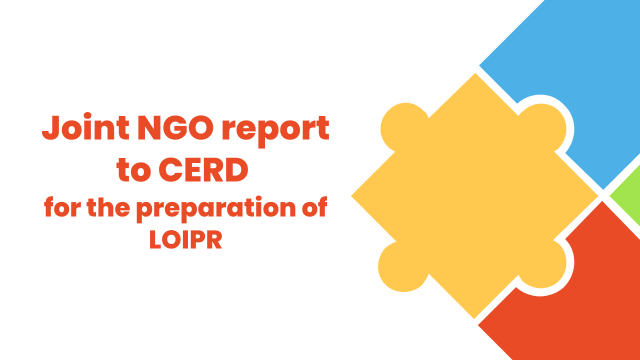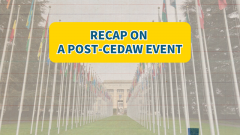Arbitrary detention in Okinawa, Japan (HRC42, 2019, OS)
September 13, 2019
IMADR delivered the oral statement on “Arbitrary detention in Okinawa, Japan” at the 42nd session of the Human Rights Council. Whole text can be read below or download here. ![]() All Okinawa Council for Human Rights (AOCHR), an NGO without ECOSOC consultative status, supported the statement.
All Okinawa Council for Human Rights (AOCHR), an NGO without ECOSOC consultative status, supported the statement.
———
Oral Statement: 42nd session of the Human Rights Council
Item 3: Interactive Dialogue with the Working Group on Arbitrary Detention
13 September 2019
Speaker: Taisuke KOMATSU
Thank you Mr. President,
We thank the Working Group for its continuous efforts to respond to human rights violations suffered by persons deprived of liberty and drawing the attention of States and the international community to their situations. We are deeply concerned by the widespread use of arbitrary detention across regions. In Japan, pre-trial detention can be extended to maximum 23 days for one charge, subjecting suspects to long-hour interrogations without the presence of lawyer. This practice has been widely criticised as “hostage justice”.[1]
The case of Mr. Hiroji Yamashiro, a prominent human rights defender in Okinawa, Japan, was one of the clear examples of “hostage justice”, which he was subject to pre-trial detention for five months for three charges until March 2017. Together with All Okinawa Council for Human Rights (AOCHR), we express our great appreciation to the Working Group’s opinion No. 55/2018 which they declared his detention to be arbitrary and directly connected to his exercise of freedom of expression and peaceful assembly against the constructions of new U.S. military facilities[2].
We echo the Working Group’s observation in the annual report that an increased response rate for follow-up communications does not necessarily translate into implementation. For instance, the Government of Japan updated the Working Group on the Supreme Court‘s decision to reject the appeal of Mr. Yamashiro, but it has failed to implement the recommendations including providing reparations and conducting independent investigations into violations of his rights.
The gap between international human rights standards related to deprivation of liberty and the domestic legal framework in Japan remains wide. In order to close this gap, we urge the Government of Japan to allow the Working Group to undertake a country visit which has been pending since 2015.
Thank you Mr. President.
[1] Japan Federation of Bar Associations (JFBA), Reform of the Criminal Justice System, https://www.nichibenren.or.jp/en/about/activities/Criminal_Justice.html
[2] https://www.ohchr.org/Documents/Issues/Detention/Opinions/Session82/A_HRC_WGAD_2018_55.pdf





